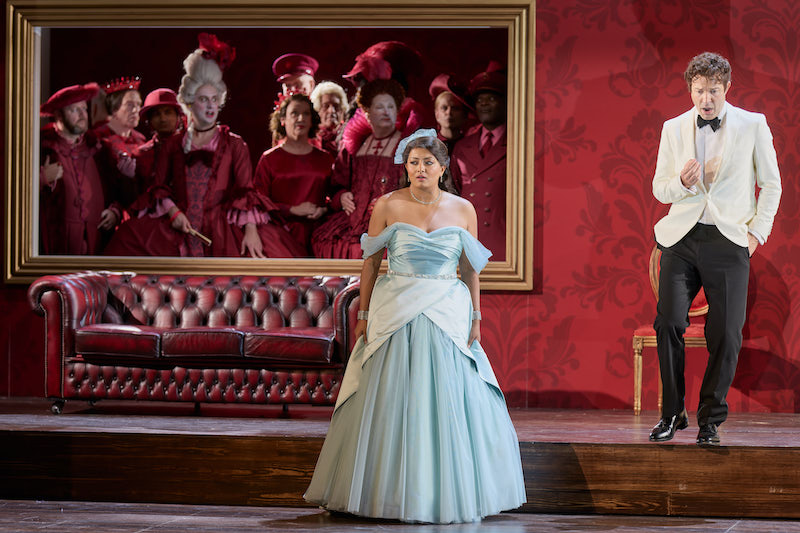Composer: Gioachino Rossini
Libretto: Christopher Cowell, based on the original by Jacopo Ferretti
Director: Julia Burbach
The last time the West End played host to an updated, modern-day take on Cinderella, it did not go well. It wasn’t that Andrew Lloyd Webber’s vision of the story was bad as such, although Emerald Fennell’s limp book didn’t help. Still, it certainly didn’t feel like the composer at his best, and there certainly wasn’t enough to justify extracting the story from the stranglehold Britain’s pantomime industry has on the story.
English National Opera ought to feel on firmer ground with La Cenerentola, marketed here in line with ENO’s English language policy under the Anglicised Cinderella. Gioachino Rossini’s two-act opera may not have been the first to bring Perrault’s folk tale to the stage, but it is one of its most enduring.
Director Julia Burbach, set designer Herbert Murauer and costume designer Sussie Juhlin-Wallén have reimagined the story in the present day, turning sisters Clorinda and Tisbe (Isabelle Peters and Grace Durham) into a pair of Insta-loving party girls who disparage their orphaned step-sibling, Deepa Johnny’s Cinderella, at every opportunity. Cinders is part cleaner, part personal assistant, but she remains the only one who is moderately civil to the Amazon-style delivery driver who delivers parcel after parcel of dresses and shoes to the family home.
Of course, that driver is actually someone in disguise. David Ireland’s Alidoro, who takes up the scheming/helpful role that later gets ascribed to a fairy godmother, is imbued with some of that supernatural element here: he has an entourage of mice helpers (children in what appear to be Bagpuss-inspired headpieces) and frequently hangs about with the ghost of Cinderella’s dead mother (dancer Sarah Storer).
The mother plays no role in the story other than looking wistful and occasionally moving the walls of Muraruer’s beautifully 1960s, dual-level modernist set. But her continued presence does provoke one to wonder what she could have seen in Simon Bailey’s Don Magnifico, who is every bit as dreadful as his daughters.
Through this chaotic family, Aaron Godfrey-Mayes’s prince, Don Ramiro, strides in and makes it obvious why he is the perfect match for Johnny’s kind, forgiving Cinderella. Even when egged on by the 18-strong chorus – here represented as spirits of his ancestors from the ages, scarlet-clad and mischievous, like a couture version of the BBC sitcom Ghosts – Godfrey-Mayes exudes calm gentility. Even at the end, as he vows revenge on Don Magnifico’s family for the way they have treated Cinderella, one never really feels his heart is in it.
At times, that placidity does also come out in a quieter voice that tends to get lost in some of the opera’s more frenetic ensemble numbers. Such moments are not helped by Christopher Cowell’s libretto, which often struggles to combine his love for torturous rhymes with the swift polysyllabic requirements of Rossini’s fast-paced melodies. All too often, the cast find themselves tripping over the lines to make them fit the pace of the score; this is far from the fault of conductor Yi-Chen Lin, whose command of her orchestra becomes the opera’s high point.
It is only until Act II, when both Godfrey-Mayes and Johnny get the opportunity to be quieter, slower and more reflective, that we see the charm of Rossini’s source material be truly matched by the potential of this staging.
That’s not to say the rest is rotten – indeed, as an introduction to opera for younger people, this production of Cinderella has much to offer it. But the world that has sprouted from Burbach’s imagination does not quite do Rossini justice. This retelling of the classic fairy tale is far better musically than Lloyd Webber’s attempt. Still, everything else is a little too chaotic and muddled for this production of La Cenerentola to become a classic of the ENO repertoire.
Runs until 14 October 2025
The Reviews Hub Star Rating
